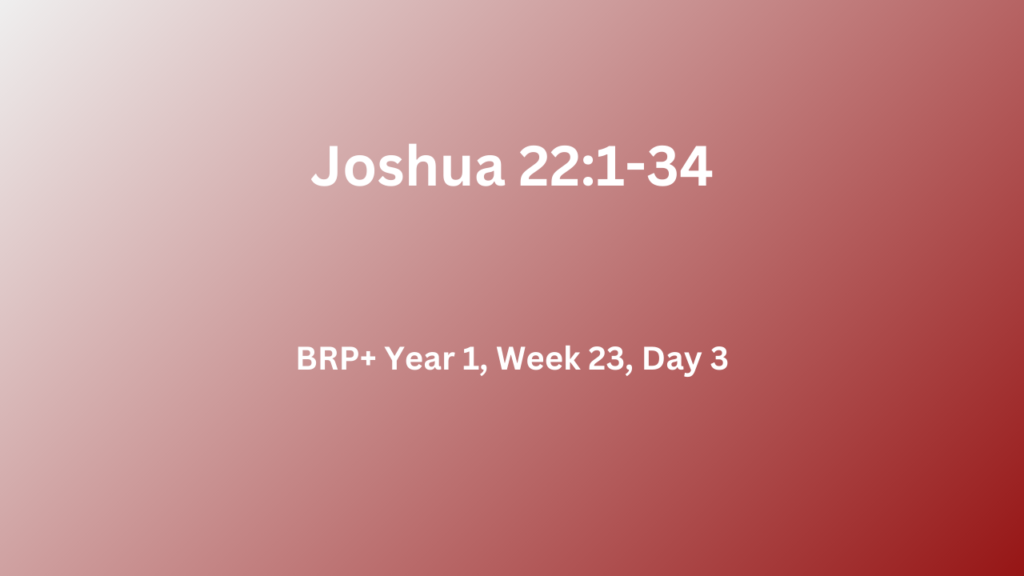Joshua 22:1-34
Q.1. What charge did Joshua give to the tribes before returning to their inherited lands east of Jordan? Was it a happy send-off? Did they leave empty-handed? – (Josh.22:1-9)
Joshua commended the tribes east of the Jordan when they had fulfilled all their obligations to help settle the tribes in the Promised Land (Josh.22:1-2). He then gave them a solemn charge to – be very careful to observe the commandment and the law which Moses the servant of the Lord commanded you, to love the Lord your God and walk in all His ways and keep His commandments and hold fast to Him and serve Him with all your heart and with all your soul (Josh.22:5). It was a happy parting with the representatives of the other tribes, and Joshua blessed them and gave them their share in the spoils of battle – and said to them, “Return to your tents with great riches and with very many livestock, with silver, gold, bronze, iron, and with very many clothes; divide the spoil of your enemies with your brothers.” (Josh.22:8 c.f. Josh.22:9).
Q.2. How did the other tribes of Israel react to the memorial altar? Why? How did the eastern tribes explain their actions? What do we learn from this incident? – (Josh.22:10-25)
One of the first acts of the returning tribes was to – … build an altar there by the Jordan, a large altar in appearance (Josh.22:10). When the tribes in the Promised Land heard about the altar – … the whole congregation of the sons of Israel gathered themselves at Shiloh to go up against them in war (Josh.22:12). Fortunately, they first sent a delegation headed by Phinehas, to address what they considered was rebellion against God. They were afraid this would cause God to bring His wrath on all of Israel (Josh.22:16-18). They even offered to make room for these tribes in the Promised Land if their inheritance was inadequate for them (Josh.22:19). They reminded these tribes of how God had dealt with unfaithfulness and pleaded – … do not rebel against the Lord, or rebel against us by building an altar for yourselves, besides the altar of the Lord our God (Josh.22:19). However, it soon became apparent that they had misjudged the motives of the tribes east of Jordan. For a start, the altar was not an alternative to the one in Israel for bringing offerings (Josh.22:22-23). Rather – 24 But truly we have done this out of concern, for a reason, saying, `In time to come your sons may say to our sons, “What have you to do with the Lord, the God of Israel? 25 For the Lord has made the Jordan a border between us and you, you sons of Reuben and sons of Gad; you have no portion in the Lord.” So your sons may make our sons stop fearing the Lord.’ (Josh.22:24-25). The incident that almost led to massive loss of life was a misunderstanding. The sons of Israel had misjudged the motives of their fellow Israelites. What an important lesson.
Q.3. Why was the altar erected? By what name was the altar known? What role did Phinehas play? What did his intercession produce in Israel? – (Josh.22:26-34 c.f. Num.25:7-13)
The altar was a visible memorial, to declare that the tribes east and west of the Jordan were one nation under God – Therefore we said, `It shall also come about if they say this to us or to our generations in time to come, then we shall say, “See the copy of the altar of the Lord which our fathers made, not for burnt offering or for sacrifice; rather it is a witness between us and you.” (Josh.22:28). It was not an alternative place of sacrifice, but a witness to future generations of their intention to keep worshiping God in His appointed place (Josh.22:29). Phinehas had previously distinguished himself for his zeal for God, and the Lord had made a perpetual covenant of peace with him – Phinehas the son of Eleazar, the son of Aaron the priest, has turned away My wrath from the sons of Israel in that he was jealous with My jealousy among them, so that I did not destroy the sons of Israel in My jealousy (Num.25:11 c.f. Num.25:12-13). Here Phinehas was big enough to admit that they had misinterpreted the motivation behind this altar, and he explained this to the other tribes. This resulted in peace (Josh.22:31-33). The altar was known as a ‘Witness’ between God and His people (Josh.22:34).

